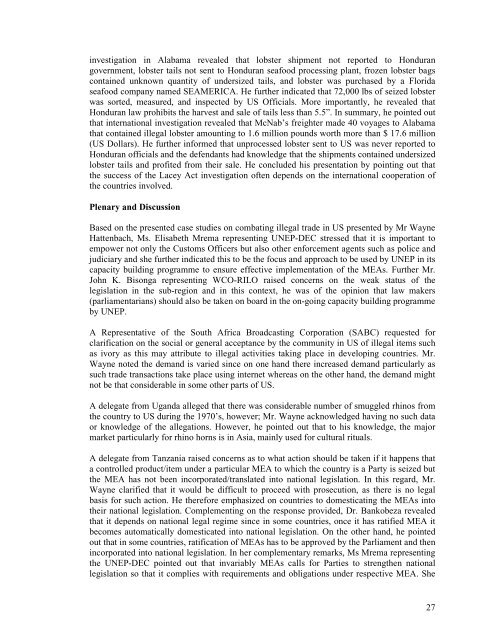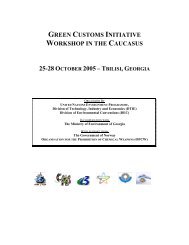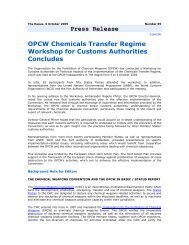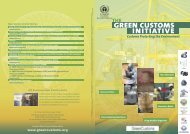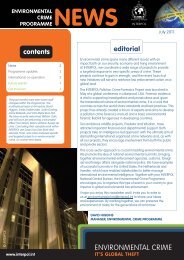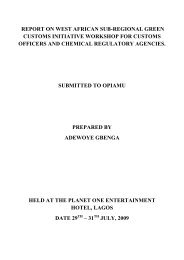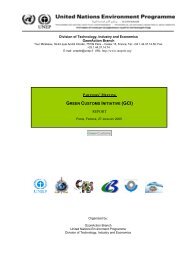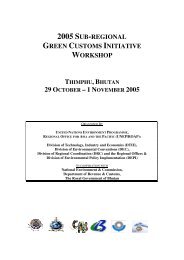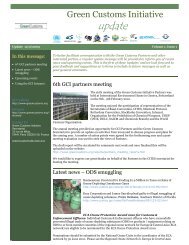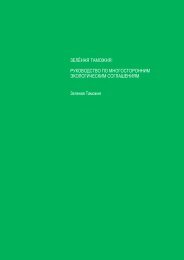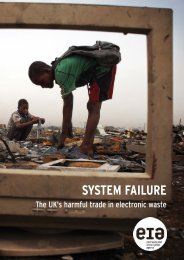Arusha - Green Customs Initiative
Arusha - Green Customs Initiative
Arusha - Green Customs Initiative
You also want an ePaper? Increase the reach of your titles
YUMPU automatically turns print PDFs into web optimized ePapers that Google loves.
investigation in Alabama revealed that lobster shipment not reported to Honduran<br />
government, lobster tails not sent to Honduran seafood processing plant, frozen lobster bags<br />
contained unknown quantity of undersized tails, and lobster was purchased by a Florida<br />
seafood company named SEAMERICA. He further indicated that 72,000 lbs of seized lobster<br />
was sorted, measured, and inspected by US Officials. More importantly, he revealed that<br />
Honduran law prohibits the harvest and sale of tails less than 5.5”. In summary, he pointed out<br />
that international investigation revealed that McNab’s freighter made 40 voyages to Alabama<br />
that contained illegal lobster amounting to 1.6 million pounds worth more than $ 17.6 million<br />
(US Dollars). He further informed that unprocessed lobster sent to US was never reported to<br />
Honduran officials and the defendants had knowledge that the shipments contained undersized<br />
lobster tails and profited from their sale. He concluded his presentation by pointing out that<br />
the success of the Lacey Act investigation often depends on the international cooperation of<br />
the countries involved.<br />
Plenary and Discussion<br />
Based on the presented case studies on combating illegal trade in US presented by Mr Wayne<br />
Hattenbach, Ms. Elisabeth Mrema representing UNEP-DEC stressed that it is important to<br />
empower not only the <strong>Customs</strong> Officers but also other enforcement agents such as police and<br />
judiciary and she further indicated this to be the focus and approach to be used by UNEP in its<br />
capacity building programme to ensure effective implementation of the MEAs. Further Mr.<br />
John K. Bisonga representing WCO-RILO raised concerns on the weak status of the<br />
legislation in the sub-region and in this context, he was of the opinion that law makers<br />
(parliamentarians) should also be taken on board in the on-going capacity building programme<br />
by UNEP.<br />
A Representative of the South Africa Broadcasting Corporation (SABC) requested for<br />
clarification on the social or general acceptance by the community in US of illegal items such<br />
as ivory as this may attribute to illegal activities taking place in developing countries. Mr.<br />
Wayne noted the demand is varied since on one hand there increased demand particularly as<br />
such trade transactions take place using internet whereas on the other hand, the demand might<br />
not be that considerable in some other parts of US.<br />
A delegate from Uganda alleged that there was considerable number of smuggled rhinos from<br />
the country to US during the 1970’s, however; Mr. Wayne acknowledged having no such data<br />
or knowledge of the allegations. However, he pointed out that to his knowledge, the major<br />
market particularly for rhino horns is in Asia, mainly used for cultural rituals.<br />
A delegate from Tanzania raised concerns as to what action should be taken if it happens that<br />
a controlled product/item under a particular MEA to which the country is a Party is seized but<br />
the MEA has not been incorporated/translated into national legislation. In this regard, Mr.<br />
Wayne clarified that it would be difficult to proceed with prosecution, as there is no legal<br />
basis for such action. He therefore emphasized on countries to domesticating the MEAs into<br />
their national legislation. Complementing on the response provided, Dr. Bankobeza revealed<br />
that it depends on national legal regime since in some countries, once it has ratified MEA it<br />
becomes automatically domesticated into national legislation. On the other hand, he pointed<br />
out that in some countries, ratification of MEAs has to be approved by the Parliament and then<br />
incorporated into national legislation. In her complementary remarks, Ms Mrema representing<br />
the UNEP-DEC pointed out that invariably MEAs calls for Parties to strengthen national<br />
legislation so that it complies with requirements and obligations under respective MEA. She<br />
27


